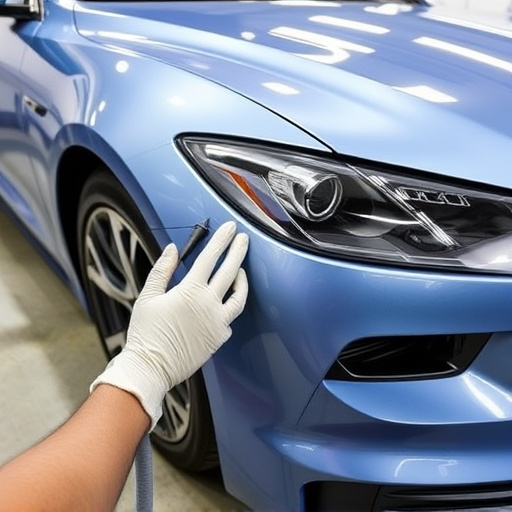EPA compliant body shops prioritize environmental responsibility and worker safety through strict regulations covering waste management, emissions control, and disposal of automotive repair materials. Compliance enhances reputation, attracts eco-conscious customers, and fosters business growth, differentiating shops as sustainable options. Best practices, advanced technologies, and employee training ensure high-quality, responsible repairs, fostering a culture of sustainability within the automotive sector.
In today’s environmentally conscious landscape, EPA compliance is more than a regulatory requirement for body shops—it’s a cornerstone of long-term sustainability. This article explores how adhering to EPA standards not only reduces environmental impact but also enhances business resilience and efficiency. We delve into the benefits of an EPA compliant repairs process, from reduced waste to safer working conditions. Additionally, we provide best practices to ensure longevity through sustainable operations in body shops.
- Understanding EPA Compliance Standards for Body Shops
- Benefits of an EPA Compliant Repairs Process
- Best Practices to Ensure Longevity Through Sustainability
Understanding EPA Compliance Standards for Body Shops

The Environmental Protection Agency (EPA) sets strict standards for body shops to ensure that auto repairs and services they provide are environmentally responsible and safe. These regulations cover various aspects, from managing hazardous waste generated during frame straightening and auto painting processes to controlling emissions from equipment and vehicles. Body shops must be EPA compliant to protect the environment and the health of their workers, which is crucial for long-term sustainability in the industry.
Compliance involves adhering to specific guidelines for disposal, recycling, and containment procedures related to materials used in automotive repair. For instance, proper handling and disposal of paint cans, solvents, and other chemical products are essential to prevent soil and water contamination. By meeting these EPA standards, body shops contribute to minimizing their ecological footprint while ensuring the overall quality and integrity of their services, making them true examples of sustainable practices within the automotive repair sector.
Benefits of an EPA Compliant Repairs Process

An EPA compliant repairs process offers significant advantages for both businesses and the environment. By adhering to Environmental Protection Agency (EPA) standards, a body shop ensures that their operations minimize harm to ecological systems. This compliance is particularly vital in an industry like automotive repair, where various chemicals and materials are frequently handled. An EPA-compliant facility reduces the risk of toxic substances leaching into soil or water sources, preventing pollution and preserving local ecosystems.
Moreover, adopting these standards enhances a shop’s reputation as a responsible corporate citizen. Customers, especially those conscious of environmental issues, are more likely to choose an EPA compliant body shop for their vehicle repairs. This can lead to increased customer loyalty and business growth, particularly when competing against other nearby repair centers. For instance, in the case of Mercedes-Benz repairs or fender repairs, a shop that prioritizes sustainability through dent removal techniques aligned with EPA guidelines can differentiate itself as an eco-conscious option.
Best Practices to Ensure Longevity Through Sustainability

To ensure the longevity of repairs and foster a culture of sustainability within an auto body shop or collision repair shop, implementing best practices is paramount. An EPA compliant body shop prioritizes environmental stewardship, which translates into longer-lasting, more durable fixes. This involves using eco-friendly materials whenever possible, reducing waste through efficient processes like frame straightening techniques, and adopting technologies that minimize the environmental impact of operations.
Additionally, staying updated with industry standards and best practices for safety and efficiency is crucial. Proper training for employees on sustainable methods ensures consistent quality while promoting a culture of continuous improvement. By embracing these strategies, an EPA compliant body shop not only contributes to ecological preservation but also guarantees repairs that stand the test of time, making them a reliable and responsible choice for vehicle owners seeking top-notch, long-lasting service.
EPA compliance in body shops is not just a legal requirement but a cornerstone of long-term sustainability. By adhering to these standards, repair facilities can significantly reduce their environmental impact while ensuring efficient resource management and minimizing waste. This, in turn, leads to cost savings, improved customer satisfaction, and a positive reputation as an eco-conscious business. Embracing best practices for EPA compliant body shop operations sets the stage for a prosperous future, where sustainability and profitability go hand in hand.














